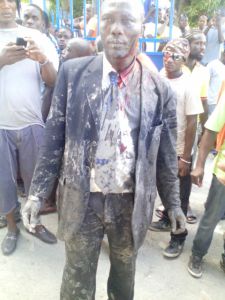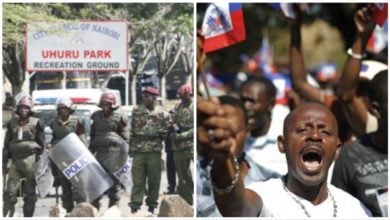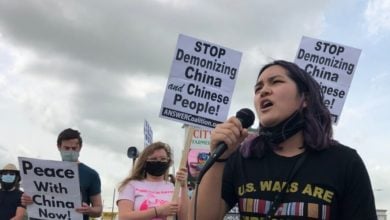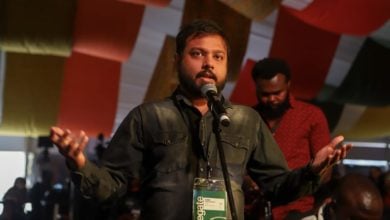It was not a joke but a tragedy which took place on Aug. 9, 2015, when Haiti held the first round of legislative elections for the entire House of Deputies and two-thirds of the Senate. Yet Haitian authorities, rather than resigning or hiding in disgrace, cry victory. Shouldn’t they be able to admit when they have committed a mistake and be ashamed?
Clearly, people like President Michel Martelly, Prime Minister Evans Paul, or Provisional Electoral Council (CEP) chief Pierre Louis Opont, the heir and student of 2010/11 CEP chief Gaillot Dorsainvil, have no concern for the country and under no circumstances should be entrusted to organize fair and credible elections. It is not an accident that Opont succeeded his former boss Dorsainvil; he ensures that Haiti’s future continues to be compromised.
Mr. Opont, Mr. Paul, and Haitian National Police (PNH) director Godson Orélus held an afternoon press conference on election day. As mayhem continued at polls around the country, Orélus declared that there was “acceptable … election security” and congratulated his police force for “good behavior.”
Opont assured the public that “acts of violence are a feature of elections” and that “these are the realities of the vote” in Haiti. He and Orélus were trying to convince the public to accept the unacceptable, namely the acts of violence, fraud, and vandalism at 50% of voting centers. Prime Minister Paul chimed in with “zero tolerance for troublemakers.” However, the biggest troublemaker was arguably the CEP chief at conference table, who called the elections “90% successful.”
Meanwhile, to clear and distract attention from himself, Opont scapegoated a CEP employee, Joseph Hébert Lucien, as being responsible for the election’s problems.
Predictably, the U.S.-led “international community” gave the elections a passing grade. Sandra Honoré, the head of the occupying force known as the UN Mission to Stabilize Haiti (MINUSTAH), as well as the “Core Group”—the ambassadors of the U.S., Canada, France, Brazil, Spain, the European Union, and the Special Representative of the Organization of American States (OAS)—all dubbed the first-round of legislative elections a “success.”
Costa Rican Ambassador Enrique Castillo, who headed the OAS’s Electoral Observation Mission (MOE), minimized the violence and ballot stuffing in favor of President Martelly’s Bald Headed Haitian Party (PHTK).
“It is important to note that these actions are not generalized and that it did not affect the whole process, since the majority of polling stations were able to complete their operations,” he said.
But the candidates of opposition parties were not as sanguine. On Monday, Aug. 10, seven parties and political grouping denounced the many problems and irregularities of the vote. These parties included the Lavalas Family Political Organization (FL), Renmen Ayiti (Love Haiti), the Fusion of Social Democrats, and Ayisyen pou Ayiti (Haitians for Haiti), among others.
The Executive Committee of the FL even called the Aug. 9 polling an “electoral coup d’état.”
Dr. Maryse Narcisse, the FL’s presidential candidate, condemned acts of violence and ballot-stuffing carried out by supporters of the PHTK, Bouclier (Buckle), and the Vérité (Truth) Platform. She asserted that only these three parties were allowed to have vote observers at the voting centers in all of Haiti’s geographic departments.
Vérité’s spokesman Joanas Gué rejected Narcisse’s accusations that his organization was involved in acts of violence. Instead, he said that the vote took place in a generally acceptable manner, although he condemned incidents in several departments.
While the foreign powers of the “Core Group” applauded the elections, a consortium of Haitian groups—the National Human Rights Defense Network (RNDDH), the National Observation Council (CNO), and the Haitian Council of Non State Actors (CONHANE)—deployed 1,500 observers across the country who contributed to a devastating report about the numerous irregularities, fraud, and violence around the country and warned the CEP not to call the first round successful.
Here is their preliminary report, entitled: “Democratic Standards Hit a Snag!”
The National Human Rights Defense Network (RNDDH), the National Observation Council (CNO), and the Haitian Council of Non State Actors (CONHANE) observed the voting process on Aug. 9, 2015. While producing a detailed report on various irregularities, incidents, cases of fraud, and numerous cases of violence identified, these organizations find it is their duty to share with all those interested in the issue their initial findings.
In the context of this election, RNDDH, the CNO and the CONHANE deployed in the field a total of 1,500 observers. They were present in all departments of the country and observed the voting process, from the opening of polling centers until the displaying of the results of the count.
A. Irregularities
1. Accreditation for election observers and political party agents
The Provisional Electoral Council (CEP) had trouble providing the different stakeholders in the electoral process accreditation cards allowing them to have access to polling centers.
In fact, election observers received their accreditation late. Some others, who were not accredited by the CEP, were content to wear a shirt with the inscription “Election Observation”.
However, institutions that had nothing to do with election observation were accredited by the CEP. Among them were MIRADE, MINO, MINOEH, etc. Their observers were in fact agents of political parties. Their intervention technique was simple: pay voters.
Furthermore, if certain political parties, favored by electoral officials, received on time their accreditation, many others had trouble getting theirs. Therefore, many officers of political parties decided to use false accreditation papers to access polling centers.
It should be stressed that the mandates distributed to political parties by the CEP were of different colors. Some received green mandates, while others received yellow.
2. Opening of the polling centers
In most polling centers, the average time that the electoral process started was at 9 a.m. For many of these voting centers, the process started following pressure from voters who were impatient and agitating in the courtyard.
The reasons for the delays in opening voting centers are numerous. Among them, we can cite the following:
• Supervisors arrived late at the polling centers,
• Supervisors did not go to where they were assigned,
• Materials were sent to locations other than their correct destination,
• The lists of the selected and trained polling station staff were altered before election day,
• Sensitive materials were not available for the start of the process,
• Polling station staff arrived late,
• Polling station staff, due to their incompetence, had trouble setting up voting operations, required before the voting process itself,
• Some polling centers were relocated at the last minute, etc.
3. Unsuitable Voting Materials
Some voting materials, such as voting booths, indelible ink, and ballot boxes were not suitable.
a) Voting booths
Voting booths failed to allow secrecy of the vote. Because of their placement on school benches, on concrete blocks, on cardboard boxes, or near windows, many troublemakers influenced or attempted to influence voters.
b) Indelible Ink
The indelible ink placed on the finger of voters who finished voting did not appear immediately. This allowed many of them to vote multiple times.
c) Urns
The ballot boxes are plastic bags, transparent, very small, and obviously unfit to hold over 400 ballots.
B. Voting Procedures
1. Physical space of polling centers and stations
The CEP established in the country a total of 1,508 voting centers. Several of them were placed in schools. Others, in public office spaces or in public markets. However, 37 voting centers were installed in private homes.
Many local schools used for the vote were often cramped and poorly lit. In some, it was dark even with broad daylight outside, forcing members of the polling stations to use lamps.
Polling stations were juxtaposed in such a cacophony that voters had trouble identifying the station where s/he had to vote.
Consequently, polling centers and stations, through their organization and their operation, did not have the capacity to receive voters and allow them to vote with dignity.
2. Mobs of voters
Voters were not, in most cases, encouraged to get in line. They had gathered as they could and waited to push into the polls in a general disorder.
Also, after voting, voters remained in the courtyard of the voting centers or in their vicinity, disrupting the elections by inviting people to vote like them. In doing so, they supported political party representatives.

3. Intimidation, threats, violence, and electoral fraud
At the very opening of the voting bureaus, that is in the early morning, individuals, armed or not, entered and ransacked the polling centers and destroyed voting materials.
In at least 50% of the voting centers, intimidation, violence, and electoral fraud were recorded. They were committed for different reasons. In some cases, it was so that the ballot boxes could be carried away or stuffed. In other cases, these acts of violence were perpetrated in order to disrupt the vote and achieve the cancellation of the election process, including when the supporters of some candidates realized that they were about to lose the elections.
The fact that cases of violence were committed in the early morning is amazing because usually they occur in the late afternoon or at the closing time of polling stations.
Many of those accredited (mandataires) were involved in cases of election violence. The latter, in fact, were not present to observe and defend the interests of their constituents. They had rather a mission to make every effort to steal the election.
In many cases, the mandataires also benefitted from the complacency of members of polling stations that allowed them to stay in the polls without identification, without [identifying] T-shirts. They also benefitted from the unconditional support of voters who, after voting, systematically refused to return home.
Faced with intimidation, threats, and acts of violence everywhere across the country, the passivity of the Haitian National Police (PNH) was constant. In the rare case where the police were required to act, it was demanded by the public.
4. Security of the vote
The PNH officers and ASE [Electoral Security Agents], who were responsible for ensuring the security of the vote, were not up to the task entrusted to them. Often, cases of fraud and electoral violence mentioned above were done in their presence.
5. Participation of voters
Voter turnout in the election of Aug. 9, 2015, appears to be the lowest ever recorded since the 1987 elections This situation is related to several factors which include:
• Lack of preparation of the CEP,
• The absence of electoral campaigning by the candidates,
• Late voter education,
• Lack of time for civic education of citizens,
• Irregularities in the Partial Electoral Lists (LEP)
• The inaccessibility of polling centers,
• The non-operation of the CEP emergency numbers on election day,
• The pre-election insecurity, etc.
To illustrate the case of low voter turnout, RNDDH, the CNO, and the CONHANE emphasize that at some polling stations, the number of voters who were recorded as having voted was higher than the number of voters who actually voted.
6. Counting
In general, the vote-counting process was conducted transparently. However, it is at this stage that we have seen the failure of members of polling stations to differentiate between blank ballots, spoiled ballots, invalid ballots, valid ballots, and ballots for no candidate.
It should be noted that for some voting centers, counting was not carried out despite the fact that the process has run its normal course. At other centers, the counting took place in police stations.
In conclusion, the RNDDH, the CNO and CONHANE believe that the Aug. 9, 2015, election was marred by serious irregularities, acts of violence, and fraud.
The CEP was committed at all costs to holding the elections, regardless of their quality. The result is obvious: the Aug. 9, 2015, elections took place in total disrespect of Human Dignity.
It is inconceivable that a country like Haiti, which prides itself on defending the rule of law and democracy, carries out in the 21st century elections where democratic standards hit a snag. It is unacceptable that majority rule is used by the authorities to justify the utter failure in the organization of this election. The mistakes of Aug. 9, 2015, should be recognized by those who are also called upon to organize the upcoming elections in order to improve what needs to be.
Moreover, there is no doubt that the elections of Aug. 9, 2015, raises the problem of legitimacy of representatives coming to the Haitian Parliament. Therefore RNDDH, the CNO, and the CONHANE call on all the actors involved at any level whatsoever in the electoral process, never to trivialize the facts recorded in this election and advise the CEP to be wary of anyone who tells it that everything went well.
The electoral body should instead do everything possible to correct its aim in the next election.






